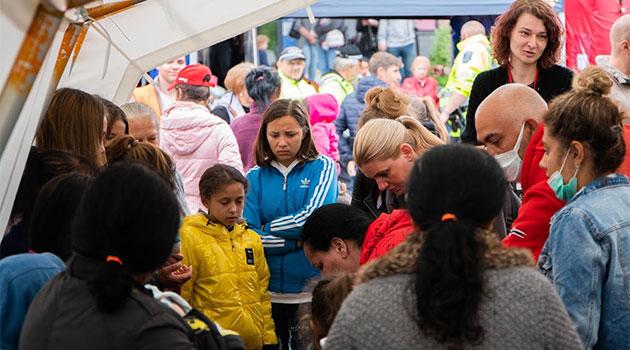Czech Consortium of NGOs Working with Migrants: Nonprofits are aiding refugees without financing from the state and are substituting for what the state itself should be doing

The collaboration of the Czech state with the nonprofit organizations working with the refugees from Russia’s war on Ukraine and focusing on their integration has become stuck because there is no definition of the roles to be played by local authorities, the nonprofit sector, Regional Authorities and the state itself when handling the influx of refugees, and no clear leadership in place. Communication is also said to be insufficient among these various stakeholders.
The experience in the field and the know-how of the nonprofits are also not being used. The Consortium of NGOs Working with Migrants held a press conference yesterday to communicate their perspective on the situation.
The group includes 15 organizations. Consortium experts are also asking to be involved more by the state in the drafting of immigration laws and measures.
Since the beginning of March, Consortium members have provided almost one million aid interventions, either at admission centers or when responding to calls placed to their information lines. About 56 600 refugees have been assisted by Consortium interpreters and 40 900 have been helped with housing.
Around 10 900 refugee children from Ukraine have received Consortium aid at school. The incoming refugees have also received humanitarian assistance from the Consortium.
About 1 300 volunteers have been involved who have worked almost 40 000 hours. These numbers and quantities are based on estimates produced by 11 of the Consortium organizations, including ADRA, the Association for Integration and Migration, Caritas Czech Republic and the Organization for Aid to Refugees.
“The NGOs became immediately involved without financial support from the state. Financing for them from the state has not yet arrived,” said Consortium head Andrea Krchová.
“A collection by People in Need has been the sole source of financing for these organizations to work on this situation,” Krchová said. According to the Caritas Czech Republic National Coordinator of Aid to Refugees, Klára Boumová, currently nonprofit organizations are substituting for the role that the state itself should be performing.
“In the long run, this system is unsustainable. We call for greater involvement of the municipalities, which need methodological and financial support from the state and the Regional Authorities,” Boumová said.
“When working with clients in the field, we see the confusion and the lack of information transmission,” Boumová said. The Government did not approve any strategy for responding to the refugee wave until mid-April.
The one it did approve has 13 chapters. The Consortium welcomed the creation of the document at the time.
However, the Consortium is now pointing out that even after a month and a half there is no action plan ready for determining the deadlines by which tasks should be fulfilled, who will finance what, and whose responsibility which tasks are. There are 13 groups on the list of tasks.
Consortium organization representatives are in four of the groups. The Consortium expects greater inclusion of academia and of its own experts in the preparation of such steps.
According to the organizations, the interconnection of and the superstructure for such teams are also missing, which is why the approach being taken is not a comprehensive one. A coordinator in charge of designing this is envisaged by the strategy.
The Interior Minister himself is performing that role for the time being. According to the Consortium, an expert should take over who could devote herself or himself to the issue with a team full-time.
This person should work with information from institutions such as Labor Offices, local authorities and the state, based on which he or she would design measures that are systematic. The different ministries are said to be counting on financing these measures mainly through subsidies.
According to the Consortium, the low number of applications for financing this work reveals the dysfunctionality of the financing model. The Consortium recommends local authorities be paid “per capita” for aiding refugees.
The organizations also agree that incoming refugees should be redistributed voluntarily throughout the country. However, both local authorities and the refugees themselves lack information about opportunities to register for doctors, housing, jobs and places in the schools, according to the Consortium.
The nonprofits are also pointing out that once the year-long temporary protection status expires, it is not clear what position the refugees will be in, which complicates their employers’ situations and their integration, as the future of their lawful residency is uncertain. “Strategic communication” with local residents throughout the Czech Republic is also necessary, because their support and willingness to aid refugees from Ukraine is decreasing gradually, the organizations’ representatives said.
